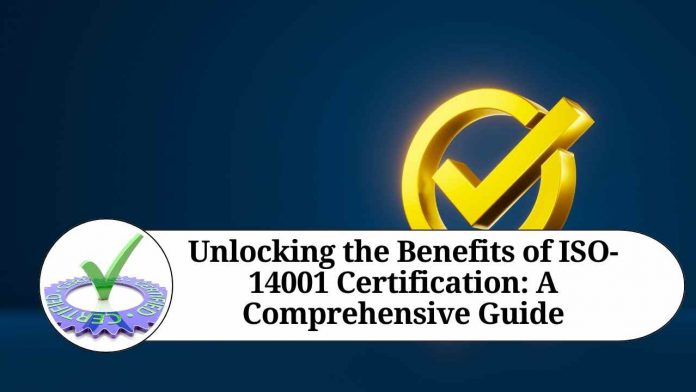ISO-14001 is a globally recognized standard for environmental management systems (EMS) established by the International Organization for Standardization (ISO). The standard outlines a systematic approach to managing and continuously improving an organization’s environmental performance. In this blog, we will discuss the importance and benefits of ISO-14001 certification for businesses.
Why is ISO-14001 Certification Important?
Organizations today are under increasing pressure to reduce their environmental impact, not just to meet regulatory requirements but also to meet the expectations of stakeholders, customers, and investors. Implementing an EMS based on ISO-14001 enables organizations to effectively manage their environmental impacts, demonstrate their commitment to sustainability, and improve their reputation.
ISO-14001 certification provides a framework for organizations to systematically identify and control their environmental impact, comply with legal requirements, and continuously improve their performance. It helps organizations to reduce waste, save energy, reduce carbon footprint, and conserve natural resources. It also helps to prevent environmental incidents and mitigate their impact.
Benefits of ISO-14001 Certification
- Improved Environmental Performance
Implementing an EMS based on ISO-14001 enables organizations to systematically identify and manage their environmental impacts. By doing so, organizations can reduce their environmental footprint, prevent pollution, and conserve natural resources. It also helps organizations to comply with environmental regulations and reduce the risk of environmental incidents.
- Cost Savings
Implementing an EMS can help organizations to reduce waste, save energy, and conserve natural resources, which can result in significant cost savings. It also helps organizations to identify areas where they can improve their environmental performance and reduce their environmental impact, which can lead to cost savings in the long run.
- Enhanced Reputation
ISO-14001 certification demonstrates an organization’s commitment to environmental sustainability and responsible business practices. It can enhance an organization’s reputation and improve its brand image. It also helps organizations to meet the expectations of stakeholders, customers, and investors who are increasingly concerned about environmental issues.
- Competitive Advantage
ISO-14001 certification can provide organizations with a competitive advantage by demonstrating their commitment to environmental sustainability and responsible business practices. It can also help organizations to meet the requirements of customers and stakeholders who are increasingly demanding environmentally sustainable products and services.
- Continuous Improvement
ISO-14001 certification requires organizations to continuously improve their environmental performance. It provides a framework for organizations to identify areas for improvement and implement measures to reduce their environmental impact. This helps organizations to stay ahead of environmental regulations and meet the expectations of stakeholders, customers, and investors.
Conclusion
ISO-14001 certification is an internationally recognized standard for environmental management systems. It provides a framework for organizations to systematically identify and manage their environmental impact, comply with environmental regulations, and continuously improve their environmental performance. Implementing an EMS based on ISO-14001 can provide organizations with numerous benefits, including improved environmental performance, cost savings, enhanced reputation, competitive advantage, and continuous improvement.
Other Related Blogs: Section 144B Income Tax Act
Frequently Asked Questions (FAQs)
Q: What is ISO-14001 Certification?
A: ISO-14001 certification is a globally recognized standard for environmental management systems (EMS). It provides a framework for organizations to systematically manage their environmental impact, comply with environmental regulations, and continuously improve their environmental performance.
Q: Why should my organization get ISO-14001 certified?
A: ISO-14001 certification can provide numerous benefits to your organization, including improved environmental performance, cost savings, enhanced reputation, competitive advantage, and continuous improvement.
Q: How do I get ISO-14001 certified?
A: To get ISO-14001 certified, you need to implement an EMS based on the requirements of the standard and undergo an external audit by a certification body. The certification body will assess your EMS and verify that it meets the requirements of the standard.
Q: What is involved in implementing an EMS based on ISO-14001?
A: Implementing an EMS based on ISO-14001 involves the following steps: understanding the requirements of the standard, establishing an environmental policy, identifying and assessing environmental impacts, setting environmental objectives and targets, implementing a program to achieve objectives and targets, monitoring and measuring environmental performance, and conducting management reviews.
Q: How long does it take to get ISO-14001 certified?
A: The time it takes to get ISO-14001 certified depends on the size and complexity of your organization and the scope of your EMS. On average, it takes around six to twelve months to implement an EMS and get certified.
Q: How often do I need to renew my ISO-14001 certification?
A: ISO-14001 certification is valid for three years. You need to undergo surveillance audits by the certification body to maintain your certification and renew it after three years.
Q: How much does it cost to get ISO-14001 certified?
A: The cost of getting ISO-14001 certified depends on the size and complexity of your organization and the scope of your EMS. The cost includes the cost of implementing an EMS, external audit fees, and certification fees. The cost can vary widely, but on average, it can range from a few thousand to tens of thousands of dollars.
Q: What is the difference between ISO-14001 and other environmental standards?
A: ISO-14001 is a generic environmental management standard that can be applied to any organization. Other environmental standards, such as EMAS, focus on specific sectors or regions. ISO-14001 is also compatible with other ISO management system standards, such as ISO-9001 (quality management) and ISO-45001 (occupational health and safety management).
Q: Can ISO-14001 help my organization reduce its environmental impact?
A: Yes, implementing an EMS based on ISO-14001 can help your organization reduce its environmental impact by systematically identifying and managing environmental impacts, reducing waste, saving energy, and conserving natural resources.




















